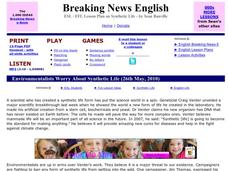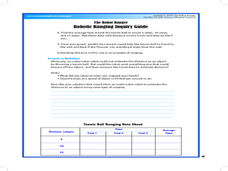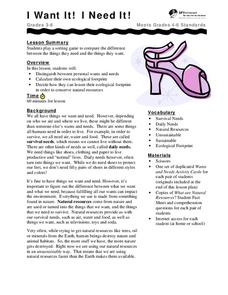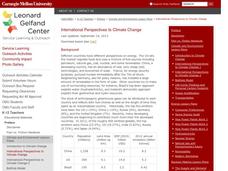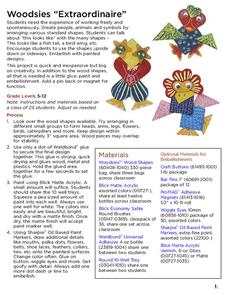Curated OER
Environment: A Day Around the Bay
Learners examine various scenarios about pollution around bays and discuss their reactions to them. Among the situations they investigate are construction site soil washing into a tributary, oil from motor boats leaking into water, and...
Curated OER
The Letter P Popcorn Balls
Students examine the letter and the sounds of P. They are read a book about popcorn and make treats for an activity. They identify other words that begin with P as well.
Curated OER
How Much Does it Cost to Light Your School?
Students explore the cost of electricity used to light their classrooms. They compute the cost of electricity as well as the number of kilowatt hours of electricity used during the school year. Students compute the number of tons of coal...
Curated OER
Breaking News English: Environmentalists Worry About Synthetic Life
In this ESL reading comprehension worksheet, students read or listen to the passage, then complete a wide variety of warm-up activities, as well as before listening/reading, while listening/reading, after listening/reading, discussion,...
K12 Reader
Limited Resources
Here's a comprehension exercise that asks readers to include direct quotes in their analysis of an article on ways to conserve natural resources.
Curated OER
Design an Island
Students explore islands. They create a two- or three-dimensional map of an island. They explain how the topography of an area influences the location of water sources, ecosystems, and human settlements. Lesson includes adaptations for...
Curated OER
Environmental Art
Students create their own environmental art after the teacher shows them a variety of example and has a discussion about it. They then write an initial personal definition of environmental art.
Curated OER
Reading: No Home on the Range
In this poetry analysis worksheet, students read a poem called "No Home on the Range" by LaVonne Houlton. Students answer 8 multiple choice questions about the poem.
Curated OER
Pennsylvania facts by the numbers
In this Pennsylvania facts worksheet, students research Pennsylvania history and trivia and answer questions where they calculate the answers about Pennsylvania. Students complete 10 questions.
Curated OER
Pollution and Marine Life
In this pollution and marine life learning exercise, students use 9 given terms related to types of pollution and ocean food chains to complete sentences. Students number the effects of human sewage and soil runoff that harm ocean...
Curated OER
The Robot Ranger
Students participate in an experiment to understand how robotic systems can estimate distances. In this robotic ranger lesson, students measure the the time it takes for and object to move back and forth. Students will use a tennis...
Curated OER
Water Pollution
Fifth graders study the impact of human activity on water quality and on the ecosystems of Earth. After a discussion on the various ways that water can be polluted, groups of youngsters get together to figure out the best way to clean a...
Curated OER
Textured Animals - Stuffed Animal Still Life
After posing their stuffed animals your young artists will sketch them in light colored chalk. After sketching, the second graders fill the animal with lines to show the fur, or texture of the animal. They put a shadow under their...
Curated OER
Waste Watchers
Students recognize the importance of saving energy to save natural resources. In this saving energy lesson, students complete a worksheet to find types of electricity meters in their homes. Students use meter readings to calculate energy...
City and County of San Francisco
I Want It! I Need It!
Discuss wants and needs with your elementary ecologists and get them to consider what would happen to our natural resources if we all got everything that we want. Learners play a card sorting game and take an ecological footprint quiz on...
Kenan Fellows
Sustainability: Learning for a Lifetime – Soil
Do great gardeners really have green thumbs—or just really great soil? Environmental scholars discover what makes Earth's soil and soil quality so important through research and experimentation. Learners also develop an understanding of...
Curated OER
India: Is Terrorism Hurting the Economy?
Students investigate the effect of terrorism on the Indian economy. They conduct research on terrorist activity in India, create a timeline, and participate in a summit between Indian and Pakistan.
Smithsonian Institution
Women's Role in the War Effort
Did you know that many women were Confederate spies during the Civil War? The resource focuses particularly on the important role women played for both the Union and Confederacy. It uses exercises such as a discussion, video, analyzing...
Carnegie Mellon University
International Perspectives to Climate Change 1
After a lecture about how the first industrial revolution triggered the path to climate change, your environmental studies class discusses what the impacts are. In a culminating activity, they get into groups and identify countries on a...
Florida Department of Environmental Protection
Build Your Own Aquifer
Ever wondered how an aquifer works? Introduce your class to the amazing way many people get water by exploring how underground aquifers work. Two fun hands-on activities are used to help kids understand what an aquifer is, how it works,...
Curated OER
Woodsies "Extraordinaire"
Allow your class to use their imaginations and create fun creatures with various wooden shapes and other embellishments. What a great way to encourage your young artists to stretch their minds!
Dick Blick Art Materials
Woodsies “Extraordinaire”
"This looks like an owl!" Kids get a chance to create all sorts of things by arranging various shapes, painting them, and gluing them together. A great way to encourage creativity and spontaneity.
NASA
Keeping Nine Eyes on the Weather
Take a look at climate change from another angle. Readers learn about the MISR instrument on the Terra satellite and how it studies Earth. Pupils experience how the multiple cameras give scientists multiple views so they can better study...
Curated OER
Gasoline Use Around the World
Students contribute their own personal gasoline consumption data with other schools. They share thoughts and opinions on fossil fuels, its effects and what they can do in an effort to conserve natural resources.





